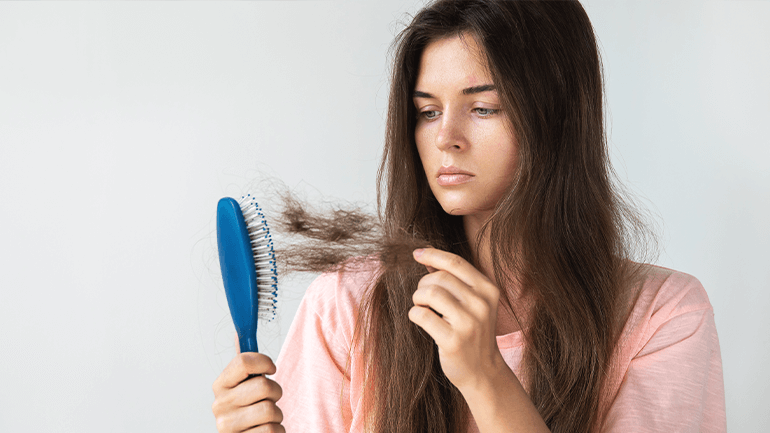8 Most Common Causes 0f Hair Loss
It is possible for hair loss to affect either the scalp or the entire body, and it can be temporary or everlasting. It can be caused by genes, hormone imbalances, illnesses, or the aging.
Everyone is likely to experience hair loss problems, although it is more prevalent among males. This condition is also known as Alopecia Areata. Commonly, baldness is related to significant shedding from the scalp.
Genetic transmission is the most prevalent reason of baldness. Some people choose to let their shedding progress untreated and unconcealed. Others may try to hide it with haircuts, cosmetics, hats, or other accessories. Others choose one of the various treatments to boost growth. Before deciding a therapy, discuss the background of your hair fall and treatment alternatives with us.
With the privilege of CLINIQUEPLUS, you can find out why you are experiencing hair fall and then have one of the best quality and safest hair transplant treatments. With this article, we want you to know about the factors that may lead to hair loss before you meet us.
1) Diverse Forms of Alopecia Areata
Alopecia is the scientific word, and alopecia areata (AA) is an autoimmune disorder in which the immune system attacks and damages hair follicles, preventing the formation of new hair.
Based on the type of AA, it might or might not affect the entire body. According to several studies, this autoimmune disorder may cause thinning hair, patches of shedding, mild balding, or complete baldness, which may be permanent or temporary. Numerous factors exist, such as genetics.
2) Hormonal Fluctuations
Androgens contribute to both male and female pattern baldness. In female baldness, androgens can lead to weak hair follicles and excessive hair loss.
Scientists explain that androgen sensitivity may be worsened by estrogen-related changes, such as the use of birth control or menopause.
In contrast, male pattern baldness is linked with a rise in the androgen dihydrotestosterone (DHT). DHT not only links to hair follicles and prevents their development but it may also shorten the total lifespan of hair.
3) Thyroid Issues
There are a number of disorders that are connected to hormones that may possibly contribute to hair fall. There is a real possibility that some include thyroid hormones.
The development of hair is one of the functions in the body that regulate by thyroid hormones.
If you receive the appropriate treatment for your thyroid problem, your hormone levels may be brought under control, and your hair loss may be stopped.
4) Drug Use
A variety of drugs used to treat common health issues cause shedding as a side effect. It’s called “drug-induced hair loss”.
Besides that, blood-thinning pharmaceuticals, antidepressants, anti-inflammatory drugs can all lead to baldness or thinning.
In addition to these, excessive vitamin A and retinoids may also give unintended results on the scalp. As they eliminate cancer cells, several chemotherapeutic medicines are known to induce complete hair fall.
5) Some Traumas
Once your body is under severe physical pressure, the natural process of growth may be disturbed, and it comes back as hair loss, typically occurring as weakening follicles or even clumping.
If there is a shock to the body systems, such as a major accident, any surgery, and burns can also damage the follicles.
This form of hair fall is also referred to as telogen effluvium, and it may heal in seven to ten months. Additionally, infections and severe diseases may also play a role in temporary shedding.
6) Stress
Significant emotional stress can disrupt the natural cycle of hair growth when a person is dealing with a challenge, such as a divorce or a breakup, bankruptcy or other kinds of financial issues, the loss of a house, or the passed of a family member.
In the Covid-19 pandemic, studies on those carrying the virus show that people are exposed to hair fall due to stress rather than the disease itself.
Typically, this sort of loss is transient, and once the stress is under control, follicles growth returns to normal.
7) Malnutrition
Vitamin deficiencies that can be a factor for hair loss are needed to take seriously. Inadequate nutrition and extreme diets that are very restricted can lead to a variety of deficiencies. These, in turn, can induce shedding, which can range from thinning hair to complete baldness.
It is imperative that you see a medical professional before beginning to take any supplements, as excessive amounts of some nutrients like vitamins A and E, as we mentioned before, have been known to induce fall of hair.
8) Excessive Care
In the pursuit of a fashionable appereance, you run the risk of causing substantial damage and breakage to your follicles, which may ultimately lead to shedding and a reduction in hair volume.
Hair loss can be seen after a variety of cases, including excessively washing the hair, using heated shaping equipment on a regular basis, touching the scalp too aggressively, and pulling on the hair.
Bonus – Cold weather: People often wonder that “Does cold weather affect hair growth”. Although you are more prone to hair loss in the winter months, this has no direct relationship with the season.
Recent studies indicate that your body generates more melatonin in winter to assist in the control of the hair development cycle, which should theoretically result in less hair loss.
Besides all the factors mentioned above, there are of course hair solutions for hair loss. People from all over the world follow the developments in the field of hair transplantation in Turkey.
Advanced methods, such as Sapphire FUE hair transplantation, are the solution to the hair loss problem of many people.
The expert staff of CLINIQUEPLUS is also a chance for you. Please contact us for detailed information about our treatments.




